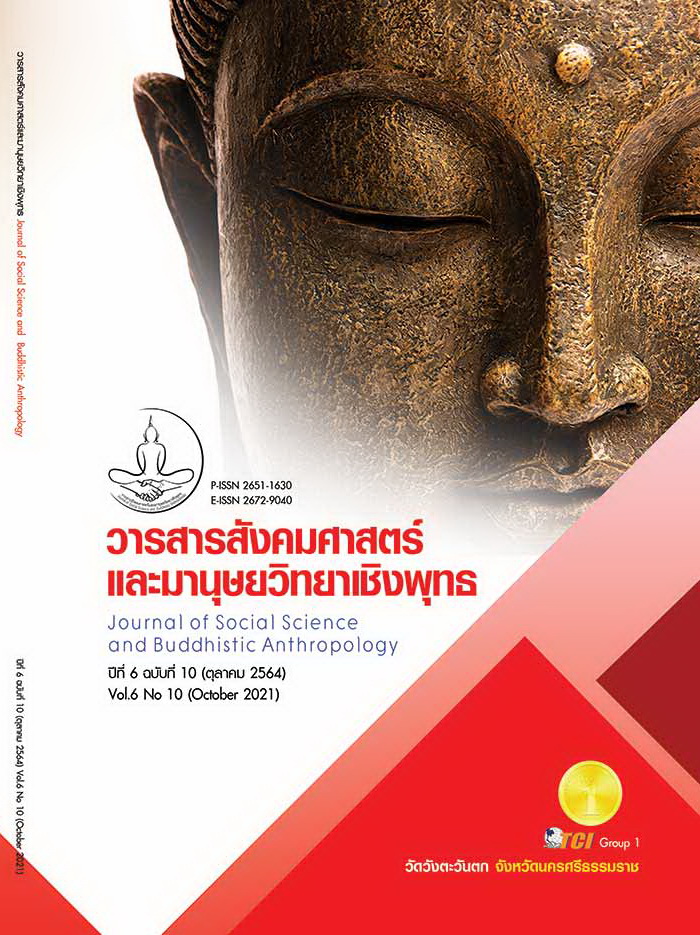PARTICIPATORY ACTION RESEARCH FOR DEVELOPING THE STUDENTS CARING AND SUPPORTING SYSTEMS ON SCHOOL AND COMMUNITY - BASED EDUCATION MANAGEMENT: CASE STUDY WAT THANGKEUN SCHOOL, THASALA DISTRICT, NAKHON SI THAMMARAT PROVINCE
Keywords:
Participatory Action Research, Student Support System, School, CommunityAbstract
The objectives of this research article were to: 1) develop a system oriented toward caring and supporting students using school and community -based education management. 2) study the results after having implemented a student care and support system using school and community-based education management. A four-step participatory action research was used: 1) Planning 2) Action 3) Observation 4) Reflection. Research population comprised 37 pre-school students and 130 primary school students. The system was evaluated by seminars of experts (Connoisseurship). Research instrument, data collection and analysis were conducted using the qualitative research design. Data analyzed were using the frequency, percentage, mean, standard deviation and content analysis. The research results revealed that: 1) Developing a system comprises six components; knowing each student individually, student screening, promoting students, preventing and seeking solutions to the problems, referring and continuing for caring in the school, and referring students to external specialist. The system’s efficiency was found at the highest level in all components. 2) The results of implementation of a system highlighted principal issues: 2.1) The participatory of the partners involved in the system scored at the highest. 2.2) The productivity of implementation of the system found succeeded in caring for all students covering all groups. The outcomes of implementation of the system suggested that self-assessment at the preschool and the primary education levels in all standards were excellent. 2.3) Success factors for implementation the system were found to include being accepted by all parties involved in the network, being applied to the students encouraging a continuous exchange of knowledge among the networks, concerning for the culture of the community both Thai Buddhists and Thai Muslims. Stakeholders involved in the network consider in multicultural issues with the implementation process to students, and using communication methods that are clear and easy to understand. 2.4) The satisfaction of the parties involved in the development of a system was found to be at the highest level.
References
กรมกิจการเด็กและเยาวชน กระทรวงการพัฒนาสังคมและความมั่นคงของมนุษย์. (2561). รายงานการพัฒนาเด็กและเยาวชน ประจำปี 2560. เรียกใช้เมื่อ 28 ธันวาคม 2562 จาก dcy.go.th/webnew/upload/download/file_th_20181211144021_1.pdf
กรมสุขภาพจิต กระทรวงสาธารณสุข. (2562). แบบคัดกรองภาวะซึมเศร้าในเด็ก: Children’s Depression Inventory (CDI) ฉบับภาษาไทย. เรียกใช้เมื่อ 3 มกราคม 2563 จาก https://www.dmh.go.tj/test/downlod/files/cdi.pdf
กลุ่มสารสนเทศ สนผ. สำนักงานคณะกรรมการการศึกษาขั้นพื้นฐาน. (2562). ข้อมูลนักเรียน โรงเรียนวัดทางขึ้น ปีการศึกษา 2562. เรียกใช้เมื่อ 20 ธันวาคม 2562 จาก https://data.bopp-obec.info/emis/schooldata-view_student_select.php?School_ID=1080210241&Edu_year=2562&Area_CODE2=8004
ธงชาติ วงษ์สวรรค์. (2554). การพัฒนาระบบการดูแลช่วยเหลือนักเรียนของโรงเรียนมัธยมศึกษาโดยใช้การวิจัยเชิงปฏิบัติการแบบมีส่วนร่วม. ใน ดุษฎีนิพนธ์ครุศาสตรดุษฎีบัณฑิต สาขาวิชาบริหารการศึกษา. กรุงเทพมหานคร : จุฬาลงกรณ์มหาวิทยาลัย.
สำนักงานคณะกรรมการการศึกษาขั้นพื้นฐาน. (2550). การประเมินความพร้อมของสำนักงานเขตพื้นที่การศึกษา. กรุงเทพมหานคร: สำนักงานคณะกรรมการการศึกษาขั้นพื้นฐาน.
สำนักงานคณะกรรมการการศึกษาขั้นพื้นฐาน. (2559). การพัฒนาระบบการดูแลช่วยเหลือนักเรียน. กรุงเทพมหานคร: โรงพิมพ์ชุมนุมสหกรณ์การเกษตรแห่งประเทศไทย จำกัด.
Crespo, B. M. et al. (2018). Youth participatory research and evaluation to inform a Chagas disease prevention program in Educador. Evaluation and Program Planning, 69(August) 99-108.
Edwards, D. B. (2019). Shifting the perspective on community-based management of education: From systems theory to social capital and community empowerment. International Journal of Educational Development, 64, 17-26.
Fowler, C. et al. (2014). Participatory action research: Involving students in parent education. Nurse Education in Practice, 14(1), 75-81.
Francis, E. et al. (2019). The healthy champions program in Pennsylvania schools: Assessment, awareness, and improvement of school wellness. Preventive Medicine Reports, 12(16), 1-6.
Hunt, P. et al. (2015). A whole school approach: Collaborative development of school health policies, process, and practice. Journal of School Health, 85(11), 802-809.
Jiand, H. et al. (2019). Effects of school-based and community- based protection services on victimization incidence among left-behind children in China. Children and Youth Services Review, 101, 239-245.
Karlberg - Granlund, G. (2019). Exploring the challenge of working in a small school and community: Uncovering hidden tensions. Journal of Rural Studies, 72, 293-305.
Kemmis, S. & Mc Taggart, R. (1988). The Action Research Planner 3rded. Victoria: Deakin University.
Li, X. & Liu, T. (2020). Community participation effects on preparedness behavior through risk perception: Empirical data of hazardous chemicals from China. International Journal of Disaster Risk Reduction, 44, 101-121.
Okitsu, T. & Edwards, D. B. (2017). Policy promise and the reality of community involvement in school-based management in Zambia: Can the rural poor hold schools and teachers to account? International Journal of Educational Development, 56, 28-41.









